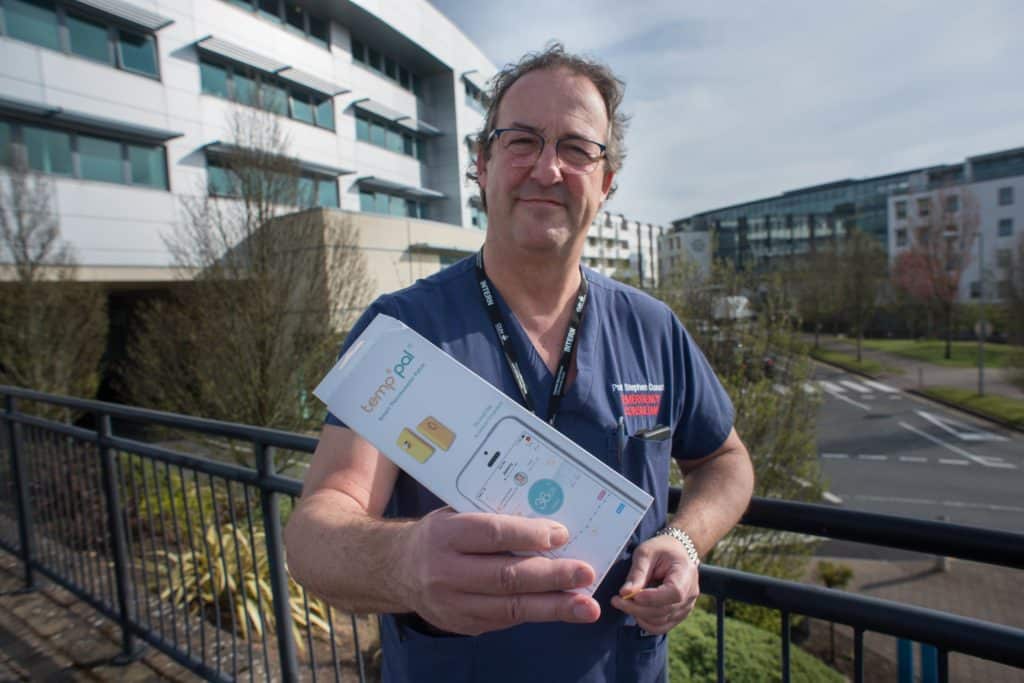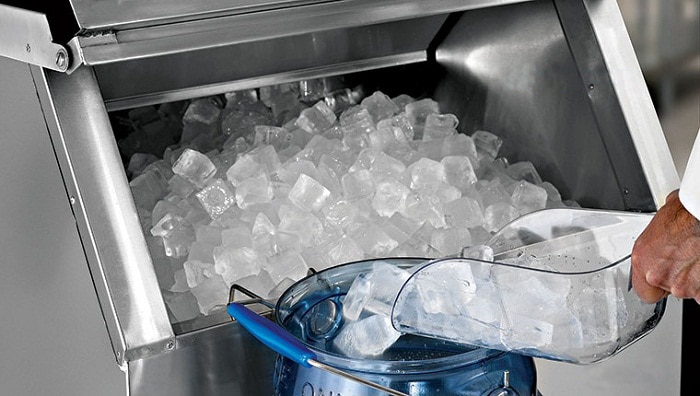
Early warning system could be rolled out across health care sector
A remote early warning system for the detection of Covid-19 symptoms among frontline medical staff at Cork University Hospital is showing promising results. The early warning system has been developed through a software industry and healthcare partnership with University College Cork (UCC).
The Covid-19 Remote Early Warning System (CREW) remotely identifies healthcare staff who may be developing a temperature, symptomatic of Covid-19. A quarter of all diagnosed cases of the Coronavirus in Ireland are among thehealthcare community who daily work on the front lines to assist our community. The single common variable in all cases of the Covid-19 virus is a rise in body temperature. CREW will remotely identify healthcare staff who may be developing a temperature that may be symptomatic of Covid-19 and who therefore should not present to work.
CREW is being developed in partnership between the College of Medicine and Health at University College Cork (UCC), the Cork based software consultancy 8 West, The ASSERT centre and Tyndall National Institute at UCC. The solution innovatively combines existing technologies to allow early detection of symptoms of the Coronavirus.
The Covid-19 Remote Early Warning System (CREW) consists of:
- A wearable digital thermometer sensor to measure axillary body temperature.
- A sensor platform e.g. smartphone, smartwatch or wearable IoT device running the CREW app.
- A cloud-based server running the CREW system which monitors the incoming data and generates automatic alarms if temperature thresholds are breached.
CREW is designed and developed by 8 West Consulting based on its SafeTrx tracking and alerting software platform. Trials using frontline staff have been underway since Friday, April 3at Cork University Hospital. Five volunteers have been wearing underarm thermometers connected to smart phones, with temperature readings being sent to the monitoring platform on an hourly basis. Where a staff member’s temperature shows signs of being elevated above the norm, they are alerted to take appropriate action and self-isolate.
Initial results from the trial with volunteers at CUH have shown accurate temperature data being successfully and continually communicated via the phones to the monitoring platform. More volunteers are now to be added and wearable devices introduced to improve the data set and test the accuracy and efficacy of CREW over a longer period of time.
Professor Stephen Cusack, Recently retired Prof of Emergency Medicine (EM), UCC, Specialty Expert in EM at UCC Academy, Consultant EM at CUH commented: “CUH Emergency Department staff are delighted to have helped pioneer an innovative 24-hour monitoring device like this. We are 24 hours on the front line of care daily, and it’s good to know that efforts like this are being made to support our wellbeing 24 hours a day too.”
Commenting on the breakthrough, Professor Barry O’Reilly, Director of the ASSERT Centre, UCC and Consultant Obstetrician/Gynaecologist at CUMH, explained “This is a novel Internet of Medical Things solution created by the collaboration of the MedTech sector and ASSERT to provide a digital COVID infection screening system for front-line healthcare staff at an extremely challenging time.”
Dr Patrick Henn, Director Research and Education at the ASSERT Centre in UCC said: “10-25 per cent of all diagnosed cases of the Coronavirus are among the healthcare community working to halt the spread of the disease. The single common variable in all cases of the Covid-19 virus is a rise in body temperature. CREW is a quarantine management platform that will hopefully allow us identify healthcare staff remotely who may be developing a temperature that may be an early sign of Covid-19 and who therefore should not present to work.’
John Murphy, CEO of 8 West Consulting who developed the solution says CREW has the potential to help not only individual medics but the wider hospital population, and the general public. “Exceptional times call for an exceptional response. This technology has been developed over the last three weeks through a huge and remarkably open effort on the part of our partners in UCC, CUH, and the team at 8 West, with technical and hardware support from Sony Network Communications Europe, Cambridge Wireless Vodafone Ireland, Huawei, Davra, BlueBridge Technologies and others.When Covid-19 struck we asked ourselves what can we do to help protect the wellbeing of healthcare workers who by the nature of their jobs are being exposed to Covid-19 on an ongoing basis? The technical community has the responsibility, and the skills to rapidly evolve and deploy a solution to support Healthcare workers, and that is what we are doing.’
CREW will available initially on iOS and Android products including phones and wearables, with other operating systems to follow. 8 West’s John Murphy says the goal of CREW is to make the solution available to as many frontline staff as possible in Ireland and around the world.
Dr Paul Galvin, Head of ICT for Health Strategic Programmes at the Tyndall National Institute said: “Tyndall is pleased to support and be part of this multidisciplinary Academic, Business and Clinical ecosystem, collaborating effectively in as a virtual team, to bring an innovative solution for real-time continuous monitoring of healthcare workers and the general population.’
How CREW Works:
A digital thermometer sensor is worn under the armpit to measure axillary body temperature. The thermometer is paired with a wearable such as the mSafety from Sony, Apple Smartwatch or Google Wear device. The body temperature readings, and other data such as heart rate, dependent on the paired wearables characteristics are sent from the wearable to a cloud-based monitoring platform. If a temperature of greater than 37.2 degrees centigrade is recorded, then the sensor platform will collect a further measurement 30 minutes later. If two subsequent elevated readings are noted, then an alert will be provided to the central monitoring console and Staff coordinator, who will then advise the staff member to self-isolate.


